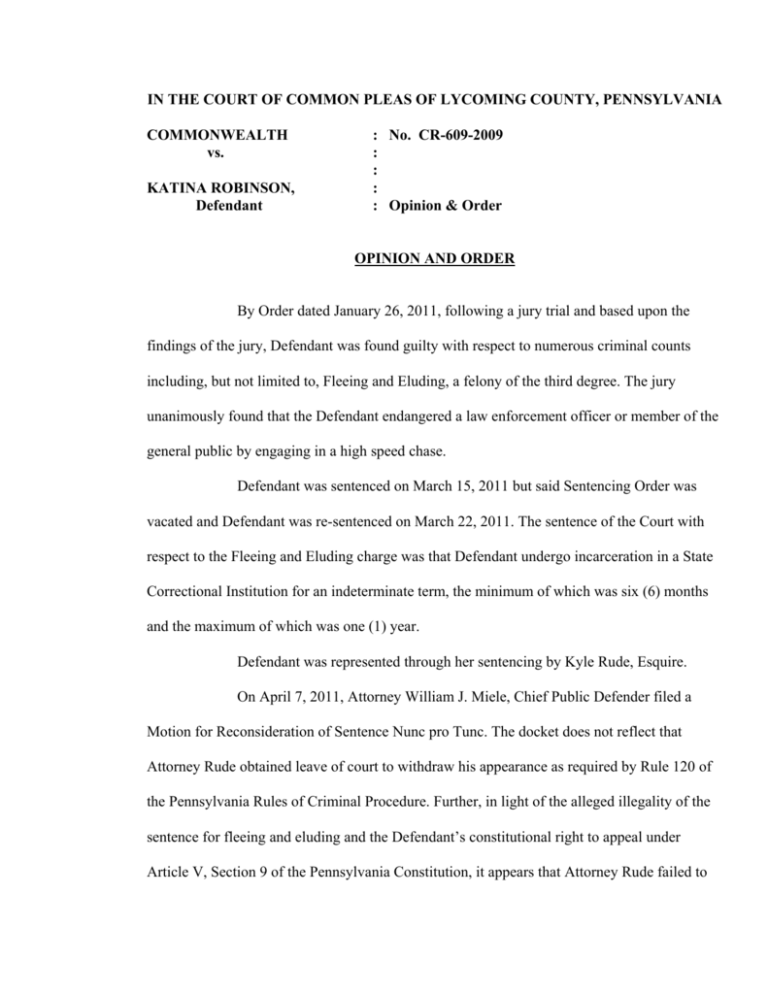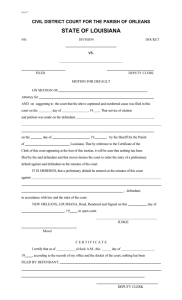Commonwealth vs. Robinson - Lycoming Law Association
advertisement

IN THE COURT OF COMMON PLEAS OF LYCOMING COUNTY, PENNSYLVANIA COMMONWEALTH vs. KATINA ROBINSON, Defendant : No. CR-609-2009 : : : : Opinion & Order OPINION AND ORDER By Order dated January 26, 2011, following a jury trial and based upon the findings of the jury, Defendant was found guilty with respect to numerous criminal counts including, but not limited to, Fleeing and Eluding, a felony of the third degree. The jury unanimously found that the Defendant endangered a law enforcement officer or member of the general public by engaging in a high speed chase. Defendant was sentenced on March 15, 2011 but said Sentencing Order was vacated and Defendant was re-sentenced on March 22, 2011. The sentence of the Court with respect to the Fleeing and Eluding charge was that Defendant undergo incarceration in a State Correctional Institution for an indeterminate term, the minimum of which was six (6) months and the maximum of which was one (1) year. Defendant was represented through her sentencing by Kyle Rude, Esquire. On April 7, 2011, Attorney William J. Miele, Chief Public Defender filed a Motion for Reconsideration of Sentence Nunc pro Tunc. The docket does not reflect that Attorney Rude obtained leave of court to withdraw his appearance as required by Rule 120 of the Pennsylvania Rules of Criminal Procedure. Further, in light of the alleged illegality of the sentence for fleeing and eluding and the Defendant’s constitutional right to appeal under Article V, Section 9 of the Pennsylvania Constitution, it appears that Attorney Rude failed to protect the Defendant’s rights by filing a timely Post-Sentence Motion or an appeal. The Court notes that regardless whether an attorney has been appointed or retained, his representation of a criminal defendant continues through direct appeal, unless he has been granted leave to withdraw by the court. Pa.R.Cr.P. 120(A)(4) and 122(B)(2). By Order dated April 11, 2011, the Court scheduled an argument on Defendant’s Motion for Reconsideration of Sentence, Nunc pro Tunc. At the argument, the Commonwealth argued that the Court lacked jurisdiction to grant the Motion despite its apparent substantive merit. The Commonwealth argued that because the Court did not address the Motion within thirty (30) days of the date of the sentence, it lost jurisdiction. See, for example, Commonwealth v. Wrecks, 934 A.2d 1287 (Pa. Super. 2007). While it may appear on its face that because thirty (30) days have elapsed since the date of sentencing and within that thirty-day period the Court did not grant the Motion for Reconsideration Nunc pro Tunc or an appeal was not timely filed, the Court may grant relief in the case of fraud or a breakdown in the processes of the Court. Commonwealth v. Patterson, 940 A.2d 493 (Pa. Super. 2007). A breakdown occurs in instances where the trial court, at the time of sentencing, fails to advise a defendant of his or her post-sentence and appellate rights. Patterson, supra.; citing Commonwealth v. Coolbaugh, 770 A.2d 788 (Pa. Super. 2011); Commonwealth v. Harris, 473 A.2d 610 (Pa. Super. 1984). In this case, the Court failed to advise Defendant of her post-sentence and appellate rights at the time of sentencing. Because of this breakdown in the court system, the 2 Defendant is entitled to proceed with the filing of a Motion for Reconsideration of Sentence, Nunc pro Tunc and the Court may proceed with deciding such at this time. In the alternative, the Court would treat the Motion for Reconsideration of Sentence Nunc Pro Tunc as a petition filed pursuant to the Post Conviction Relief Act (PCRA). Defendant argues that the Court’s sentence of six (6) months to one (1) year on the fleeing and eluding charge is illegal in light of the case of Commonwealth v. Ruffin, 2011 PA Super. 38 (February 25, 2011). The Court is constrained to agree. The Ruffin decision binds this Court to impose a sentence of no greater than three (3) to six (6) months on Defendant with respect to the Fleeing and Eluding charge, even though it is graded as a felony of the third degree. This Court does not hesitate in expressing its dismay that the Legislature could create a statutory scheme that results in a decision that makes no sense in the real world of sentencing defendants, especially under the circumstances in this case. More specifically, Defendant engaged in a high speed chase throughout the city of Williamsport endangering numerous citizens and law enforcement officers. At one point during the chase, Defendant actually crashed into a traveling motorist injuring the motorist’s minor child. The Defendant continued to flee until she crashed again disabling her vehicle. This is not the Defendant’s first time engaging in such activity. Indeed, the Defendant previously was involved in a fleeing and eluding incident wherein she killed a third party. The statutory scheme leading to the decision of the Superior Court in Ruffin leads to an inexplicable result. A defendant charged with fleeing and eluding as a first offense 3 who endangers law enforcement or a member of the general public by engaging in a high speed chase can be found guilty of a felony of the third degree and legally sentenced to a minimum of three and a half (3 ½) years to a maximum of seven (7) years in a state correctional institution. Yet, when that same defendant commits that offense a second time, even though it remains a felony of the third degree, the defendant can only be legally sentenced to three (3) to six (6) months in a county prison. The Ruffin case explains, in what can be best described as obtuse reasoning, that it can glean no apparent or obvious legislative intent. This Court fails, however, to see how the statutory language is clear or unambiguous. Furthermore, the Appellate Courts have always interpreted legislation to ensure that it does not create an absurd result. The Court believes the better decision would be one that adopted the reasoning of Judge Allen’s dissenting opinion in Commonwealth v. Ede, 949 A.2d 926 (Pa. Super. 2008), vacated and remanded by, 600 Pa. 506, 968 A.2d 228 (Pa. 2009).1 Nonetheless, this Court is bound by Ruffin. Accordingly, the following Order is entered. ORDER AND NOW, this day of May 2011 for the reasons set forth herein, the Court GRANTS Defendant’s Motion for Reconsideration of Sentence Nunc pro Tunc. This 1 Based on the cases cited in the Supreme Court’s per curiam order, it appears that the Supreme Court concluded Ede was not a second time offender and vacated the Superior Court’s decision on that basis. See Ruffin, supra. at 13 n.9. 4 case is scheduled for a re-sentencing hearing on June 2, 2011 at 11:00 a.m. in Courtroom #4 of the Lycoming County courthouse. BY THE COURT, _______________________ Marc F. Lovecchio, Judge cc: DA (AB) PD (WM) Kyle Rude, Esquire CC; APO Victim/Witness Coordinator Warden (2) Williamsport Police Department SCI – Muncy Sheriff PBPP Gary Weber, Esquire (Lycoming Reporter) Work File 5







